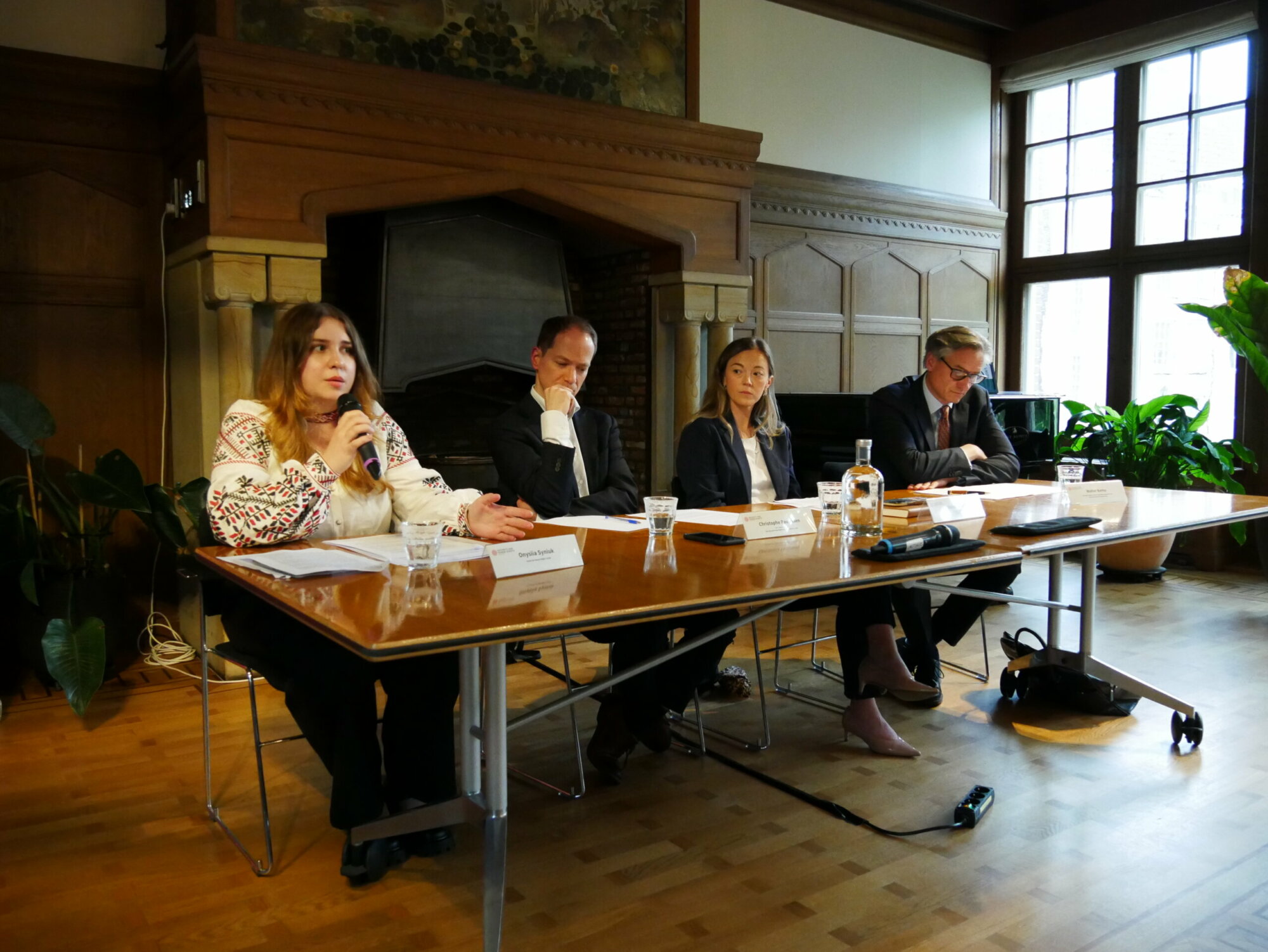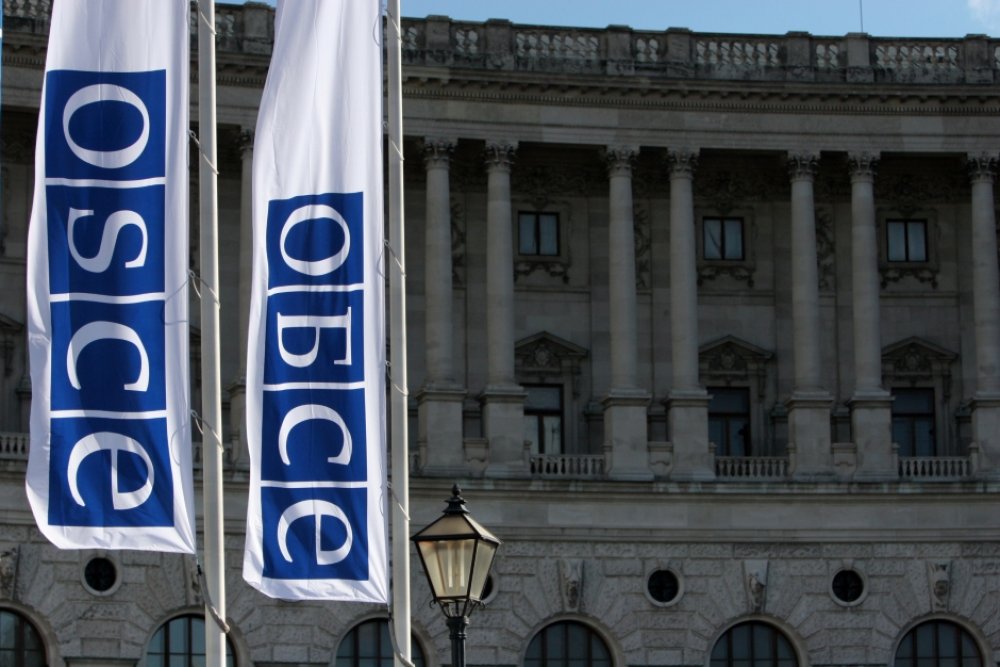
The War in Ukraine and its Long-Term Consequences for Security and Human Rights | Launch of the Security and Human Rights Journal Special Issue
On 28 May 2024, the Netherlands Helsinki Committee and T.M.C. Asser Institute welcomed civil servants, members of civil society and academia at the Nutshuis in The Hague for the launch of the Security and Human Rights Journal’s Special Issue on Ukraine. The Special Issue consists of an introduction by the three editors (Christophe Paulussen, Walter Kemp & Janice Helwig) as well as four substantive articles. Three contributors to the Special Issue – Victoria Kerr, Onysiia Syniuk and Walter Kemp – came to The Hague to present their articles and offer reflections into the enduring ramifications of Russia’s full-scale invasion of Ukraine, offering critical insights into its impact on global geopolitics and cooperative security within the region.
The full-scale invasion of Ukraine has moved into its third year. While Russia’s invasion in February 2022 took many by surprise, so too did Ukraine’s resolute defense and the unity of the West in standing up to Moscow’s aggression. But how and when will this war end? And is it possible to rebuild European security? This special issue of Security and Human Rights takes a long view on what has turned into a long war. Five articles address a range of issues related to both security and human rights as well as the potential role of the OSCE in rebuilding a post-war security order.”
(Source: Introduction to the Special Issue)
The Road to Justice: Lessons for Ukraine from the USSR Invasion of Afghanistan
The discussion started with Victoria Kerr’s and Nader Nadery’s article titled “The Road to Justice: Lessons for Ukraine from the USSR Invasion of Afghanistan”. The article was presented by Victoria Kerr who is a Scottish solicitor and consultant to the T.M.C. Asser Institute and REDRESS and works primarily on Ukraine-focused projects supporting Ukrainian criminal justice actors in investigating, prosecuting and seeking remedies for international crimes, and pursuing financial accountability with a view to reparation for victims of the conflict.
When I went to re-read this article we wrote in advance of this event, I realise that it is a meeting of minds amidst chaos, and an attempt to make sense of the nonsensical.
Kerr explained that the idea behind the article was not to compare the two distinct conflicts, but to see if history can be instructive and what implications this can have on transitional justice and international law both in Ukraine and in general. Reflecting on their article, Kerr emphasised three points of discussion – history, legacy and framing, raising victims’ voices and double standards. Firstly, the article focuses on the importance of the Russian leadership’s rhetoric of ‘Soviet greatness and Russian patriotism’.
Analysing the Russian or Soviet playbook is also connected to establishing patterns. In our work with Ukrainian justice actors, we see a tendency to consider each incident as a case, without considering the implications of the broader context on the crime in question.
Secondly, Kerr discussed the importance of raising victims’ voices. While a large majority of ‘Afghans’ prioritised accountability through criminal justice, the authorities and the international community chose to prioritise peace. Similarly, Ukrainians’ highest priority is accountability, but there is still a noticeable lack of involvement from national and international actors with civil society, victim representatives, and victims themselves in developing and implementing justice initiatives concerning Ukraine.
Putting all the emphasis on criminal justice, we may be missing how documentation, reparation, or truth-seeking could assist in allowing victims to rebuild their lives and have restorative impact.
Finally, the response of the international community was compared by Kerr. In her view, while Ukraine has gained a lot of attention in terms of accountability and criminal justice as well as support towards reconstruction, recovery and defence, the envisaged accountability mechanisms in Afghanistan were never implemented which shows the unaddressed problem of selectivity and fragmentation by the international community.
Rapidly approaching deadline: Bringing back Ukrainians deported to Russia
The second article presented was “Rapidly approaching deadline: Bringing back Ukrainians deported to Russia” by Onysiia Syniuk, legal analyst at the Centre for Human Rights ZMINA, a Ukrainian NGO working with human rights and war crimes documentation.
In her article, Syniuk analysed the case of forcible transfers and deportations of Ukrainians by the Russian Federation through a legal lens. The Russian Federation deliberately displaces Ukrainian citizens from occupied territories into Russia to subject them to Russian propaganda and in many cases to ‘russify’ them. The exact number of displaced people is unknown since Russia refuses to provide credible data.
From the legal standpoint, Syniuk argued that the displacements can be categorized as forcible transfers and deportations as they do not meet requirements of security of population being threated or there being military reasons beyond Russia’s control.
Displacement based on any other grounds is a violation of international humanitarian law and might amount to the crime of forcible transfer or deportation.
Once Ukrainians reach Russia, Syniuk asserted, they are subject to ‘filtration’ procedures and once cleared, distributed across Russia. According to Syniuk, due to the size of the operation, it is clear that the organisation was planned well in advance of the invasion.
Syniuk also emphasised the different categories of the displaced people – ones without belongings and finances due to destruction of property, dependable adults whose freedom is legally limited and orphan children, who are the most vulnerable ones to pressures of Russian propaganda.
A longer stay in Russia demands formal paperwork and very often getting a Russian passport, which is an issue for crossing the border into third countries bordering Russia, as well as leaving Russia itself, as a Russian passport in the Russian legal framework burdens the person with all the citizenship obligations – including possible conscription.
Even when these people are returned to Ukraine, there is a new reality awaiting them, Syniuk explained. She felt that the Ukrainian government has a lot to do to both return and provide adequate support.
The deportation and transfer of children specifically might arguably also amount to genocide as an act of transferring children from one group to another.
According to Syniuk, there is also an opportunity for the OSCE to be the basis or at least provide a platform for the creation of a repatriation system.
Crisis and opportunity for the OSCE
The final talk was on the article “Crisis and opportunity for the OSCE” written by Walter Kemp who is the Director of Strategy at the Global Initiative Against Transnational Organized Crime and Senior Strategy Adviser at the Geneva Centre for Security Policy. He is also an editor of the journal Security and Human Rights and author of the book “Security through Cooperation”.
Reports of the OSCE’s death are an exaggeration. The organization is certainly in trouble. But it is still alive.
Kemp discussed the future of the OSCE and what it can do given its unique position as one of the few remaining international security organisations of which Russia is still part of. While he emphasized that the main focus in the near future will be on deterrence, as well as on security against Russia through NATO and security without Russia in the EU, the OSCE still has an opportunity to position itself as a mediator between Russia and the West.
Importantly, the OSCE has experience in peace operations and monitoring missions in Ukraine, which could be beneficial for any future post-war missions. Additionally, through its Support Programme for Ukraine, the OSCE could implement a wide range of projects concerning human rights.
Among topics to consider when looking at the post-war security order are: How to strengthen security guarantees for Ukraine and other countries that are not part of alliances? How could basic principles – like those in the Helsinki Final Act – be reaffirmed credibly? How to strengthen compliance with existing commitments?
Kemp argued that organisations such as Helsinki Committees could be essential to managing dialogue and holding the leaders accountable to their promises. The 50th year anniversary of the Helsinki Accords could provide an opportunity for revival of the organisation and reaffirmation of its goals.
The three presentations were followed by a Q&A with a very engaged audience. The questions discussed transitional justice and the basis of comparison of Ukraine with Afghanistan, the future of OSCE and veto voting, deportation of children in Ukraine and the future of the Ukrainian-Russian relationship.



Comments
* Your email address will not be published